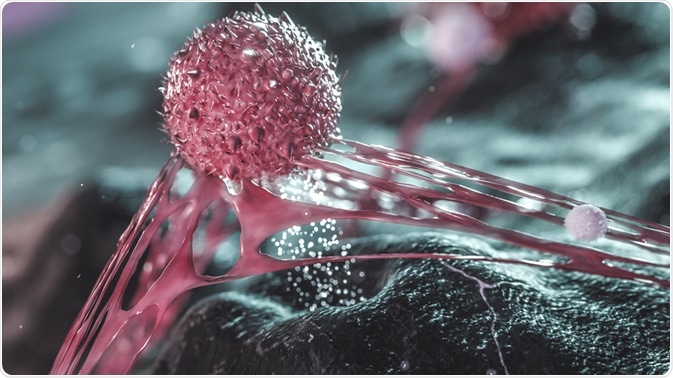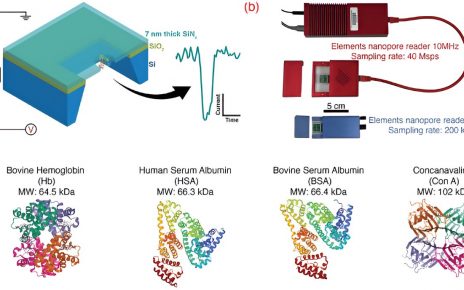Cancer is one of the leading causes of human mortality worldwide. Even though leaps have been made in the fight against it, mortality rates still remain higher than they should be. In recent decades, there has been focused research on the molecular mechanisms of cancer to try and elucidate information that will help improve drug delivery and survival rates in patients. This article will give a brief overview of this subject.
 Image Credit: CI Photos / Shutterstock.com
Image Credit: CI Photos / Shutterstock.com
The Genetic and Molecular Basis of Cancer
DNA is the basis of all life on Earth. In a healthy body, DNA divides and replicates in a normal way, without any harmful effects to the organism. However, genetic material can sometimes undergo specific damage at a molecular level due to any number of stressor factors both extrinsic and intrinsic. Hereditary conditions, exposure to radiation, and carcinogens contained within such lifestyle choices as smoking and diet are just some of the stressors that can lead to mutations in DNA.
Cancer is one result of this specific DNA damage. There are many common mechanisms that can lead to the disease and the growth of tumors within the body, most of which can have devastating effects if not detected early and treated.
For example, translocations on DNA can activate proto-oncogenes. One such example of this is Burkitt’s lymphomas, which result from the translocation of the c-Myc proto-oncogene between chromosomes.
Proto-oncogenes can also be activated by point mutations, which have been observed in malignant neoplasms. This can occur when genes that code for guanosine triphosphate-binding proteins (which normally act as second messengers in signal transduction pathways) become consistently active due to point mutations.
There are also instances when a mutation inactivates a tumor-suppressor gene which is normally responsible for suppressing cellular proliferation, leading to tumorigenesis. This occurs in many colon and lung cancers. By understanding these abnormalities at the molecular level, researchers in the field of cancer research can gain invaluable insights that will aid in more effective treatment of this disease.
Metastasis
Metastasis is when a cancer spreads from its primary organ to other parts of the body. In a majority of cancers, this is the main cause of fatality (around 90%.) Metastases to lymph nodes (which is one of the main routes of tumor proliferation throughout the body) have been detected in many cancers. This includes one-third of breast, uterine cervix, and pharyngeal cancers as well as one-quarter of lung, bladder, and gastric cancers. Prognosis for cancer patients with advanced metastasis remains extremely poor.
Cellular and molecular steps in metastasis are largely similar. The molecular mechanisms for cell invasiveness and proliferation are found at the embryonic stage, though to a lesser degree. The process is an intricate one but how it is coordinated by the cancer cell is poorly understood. It involves an interplay between factors such as cell adhesion, immune escape mechanisms, survival, migration, and proteolysis.
A Poorly Understood, Dynamic Condition
Metastasis is usually said to be controlled but it is not stochastic, rather it is the result of a complex finely tuned molecular mechanism with collaboration from both the tumor and host cells. Whilst extremely efficient at the beginning of the metastatic progression, in later stages it is extremely inefficient, in particular when it comes to regulation of tumor cell growth at secondary sites.
Because tumor spread to other organs through the process of metastasis is usually lethal, understanding the molecular mechanisms of proliferation of tumor cells under this process is therefore of paramount importance. By understanding them, more effective anti-cancer strategies can be developed.
In the classic metastatic cascade model, one factor which limits metastatic formation is growth after extravasation, which is when cancer cells exit capillaries and enter organs to form secondary tumors. Research, however, has challenged this model by demonstrating that there is ready proliferation of tumor cells after arrest in blood vessels. This suggests that extravasation is not a prerequisite for metastatic growth.
Mary Hendrix and co-workers have even demonstrated that tumor cells can function like endothelial cells and form channels that allow the flow of fluid. Players in this process include EphA2 on aggressive melanoma cells, also found on normal endothelial cells. This ‘vasculogenic mimicry’ and tumor plasticity which can lead to a variety of phenotypes demonstrates that a dynamic view of the metastatic cascade is needed.
The team has proposed that both malignant and normal cells use the same molecules to aid invasion, but the dominance of tumor cells over normal cells in the micro-environment is due to differences in downstream signaling events.
In Conclusion
The cellular environment is an incredibly complex, dynamic one in which the health of the organism can hang in the balance. Cancer, a major cause of mortality, is still baffling in some respects. DNA mutations that lead to tumorigenesis and how normally healthy signaling networks are hijacked by tumor cells to achieve proliferation throughout the body are slowly becoming better understood.
Elucidating the molecular mechanisms of this lethal disease will help future scientists develop more effective therapeutics and treatment regimens as well as improved early detection of cancer, all of which will improve the survivability rate of patients significantly.
Sources
Koeffler, HP, McCormick, F & Denny, C (1991) Molecular mechanisms of cancer West J. Med 155(5) pp. 505-14 [Accessed 03/09/2020] https://pubmed.ncbi.nlm.nih.gov/1815390/
Bogenrieder, T & Herlyn, M (2003) Axis of evil: molecular mechanisms of cancer metastasis Oncogene 22, pp. 6524-6536 [Accessed 03/09/2020] https://www.nature.com/articles/1206757
Gauwerky, C.E & Croce, C.M. (1993) Chromosomal translocations in leukemia Semin Cancer Biol. 4(6) pp. 333-340 [Accessed 03/09/2020] https://pubmed.ncbi.nlm.nih.gov/8142618/
Further Reading
- All Cancer Content
- What is Cancer?
- What Causes Cancer?
- Cancer Glossary
- Cancer Classification
Last Updated: Dec 14, 2020

Written by
Reginald Davey
Reg Davey is a freelance copywriter and editor based in Nottingham in the United Kingdom. Writing for News Medical represents the coming together of various interests and fields he has been interested and involved in over the years, including Microbiology, Biomedical Sciences, and Environmental Science.
Source: Read Full Article



